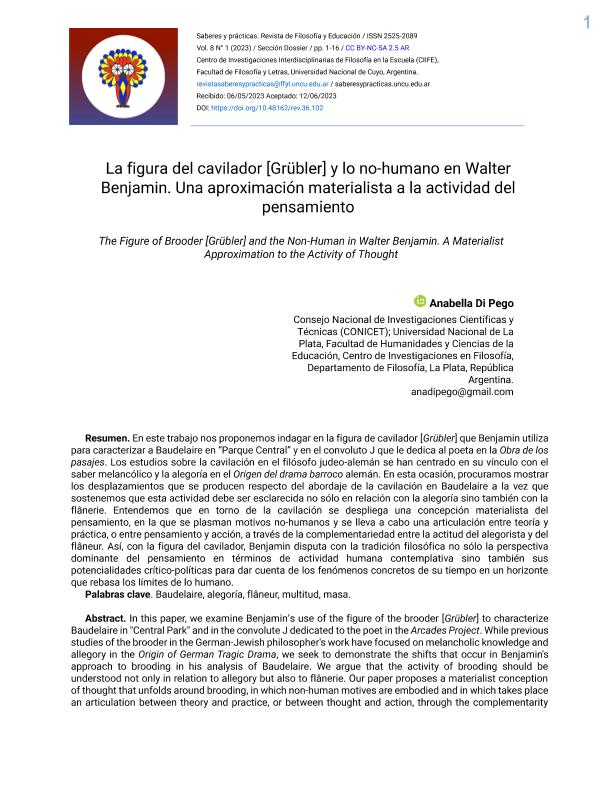Mostrar el registro sencillo del ítem
dc.contributor.author
Di Pego, Anabella

dc.date.available
2024-03-26T12:30:47Z
dc.date.issued
2023-06
dc.identifier.citation
Di Pego, Anabella; La figura del cavilador [Grübler] y lo no-humano en Walter Benjamin: Una aproximación materialista a la actividad del pensamiento; Universidad Nacional de Cuyo. Facultad de Filosofía y Letras; Saberes y prácticas; 8; 1; 6-2023; 1-16
dc.identifier.issn
2525-2089
dc.identifier.uri
http://hdl.handle.net/11336/231554
dc.description.abstract
En este trabajo nos proponemos indagar en la figura de cavilador [Grübler] que Benjamin utiliza para caracterizar a Baudelaire en “Parque Central” y en el convoluto J que le dedica al poeta en la Obra de los pasajes. Los estudios sobre la cavilación en el filósofo judeo-alemán se han centrado en su vínculo con el saber melancólico y la alegoría en el Origen del drama barroco alemán. En esta ocasión, procuramos mostrar los desplazamientos que se producen respecto del abordaje de la cavilación en Baudelaire a la vez que sostenemos que esta actividad debe ser esclarecida no sólo en relación con la alegoría sino también con la flânerie. Consideramos que en torno de la cavilación se despliega una concepción materialista del pensamiento, en la que se plasman motivos no-humanos y se lleva a cabo una articulación entre teoría y práctica, o entre pensamiento y acción, a través de la complementariedad entre la actitud del alegorista y del flâneur. Así, con la figura del cavilador, Benjamin disputa con la tradición filosófica no sólo la perspectiva dominante del pensamiento en términos de actividad humana contemplativa sino también sus potencialidades crítico-políticas para dar cuenta de los fenómenos concretos de su tiempo en un horizonte que rebasa los límites de lo humano.
dc.description.abstract
In this paper, we examine Benjamin’s use of the figure of the brooder [Grübler] to characterize Baudelaire in "Central Park" and in the convolute J dedicated to the poet in the Arcades Project. While previous studies of the brooder in the German-Jewish philosopher's work have focused on melancholic knowledge and allegory in the Origin of German Tragic Drama, we seek to demonstrate the shifts that occur in Benjamin's approach to brooding in his analysis of Baudelaire. We argue that the activity of brooding should be understood not only in relation to allegory but also to flânerie. Our paper proposes a materialist conception of thought that unfolds around brooding, in which non-human motives are embodied and in which takes place an articulation between theory and practice, or between thought and action, through the complementarity between the attitude of the allegorist and the flâneur. Therefore, with the figure of the brooder, Benjamin not only disputes the philosophical tradition dominant of thought as a contemplative human activity, but also its critical-political potential to account for the concrete phenomena of his time in a horizon that orates the limits of the human.
dc.format
application/pdf
dc.language.iso
spa
dc.publisher
Universidad Nacional de Cuyo. Facultad de Filosofía y Letras
dc.rights
info:eu-repo/semantics/openAccess
dc.rights.uri
https://creativecommons.org/licenses/by-nc-sa/2.5/ar/
dc.subject
BAUDELAIRE
dc.subject
FLANERIE
dc.subject
ALEGORÍA
dc.subject
PRAXIS
dc.subject.classification
Filosofía, Historia y Filosofía de la Ciencia y la Tecnología

dc.subject.classification
Filosofía, Ética y Religión

dc.subject.classification
HUMANIDADES

dc.title
La figura del cavilador [Grübler] y lo no-humano en Walter Benjamin: Una aproximación materialista a la actividad del pensamiento
dc.title
The Figure of Brooder [Grübler] and the Non-Human in Walter Benjamin: A Materialist Approximation to the Activity of Thought
dc.type
info:eu-repo/semantics/article
dc.type
info:ar-repo/semantics/artículo
dc.type
info:eu-repo/semantics/publishedVersion
dc.date.updated
2024-03-21T16:02:19Z
dc.journal.volume
8
dc.journal.number
1
dc.journal.pagination
1-16
dc.journal.pais
Argentina

dc.journal.ciudad
Mendoza
dc.description.fil
Fil: Di Pego, Anabella. Consejo Nacional de Investigaciones Científicas y Técnicas. Centro Científico Tecnológico Conicet - La Plata. Instituto de Investigaciones en Humanidades y Ciencias Sociales. Universidad Nacional de La Plata. Facultad de Humanidades y Ciencias de la Educación. Instituto de Investigaciones en Humanidades y Ciencias Sociales; Argentina
dc.journal.title
Saberes y prácticas
dc.relation.alternativeid
info:eu-repo/semantics/altIdentifier/url/https://revistas.uncu.edu.ar/ojs3/index.php/saberesypracticas/article/view/6791
dc.relation.alternativeid
info:eu-repo/semantics/altIdentifier/doi/https://doi.org/10.48162/rev.36.102
Archivos asociados
